theartsdesk Q&A: Musician Jim Reid of The Jesus and Mary Chain | reviews, news & interviews
theartsdesk Q&A: Musician Jim Reid of The Jesus and Mary Chain
theartsdesk Q&A: Musician Jim Reid of The Jesus and Mary Chain
On riots, drugs, drunkenness... and jazz
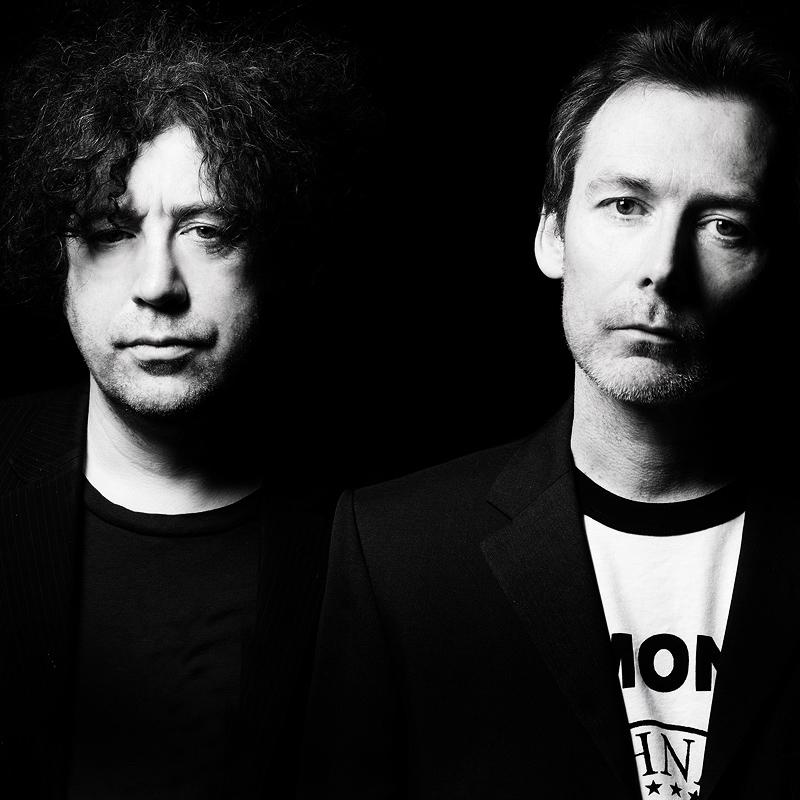
With The Jesus & Mary Chain reformed and currently touring their epochal debut album, Psychocandy, theartsdesk reaches into its archives to offer up a rare and very extensive interview with lead singer Jim Reid from 2010.
Jim Reid (b 1961) is lead singer and, with older brother William, the creative driving force behind The Jesus and Mary Chain. Together they created a furore in the mid-Eighties, bursting onto the scene with punk churlishness, a uniquely noisy sound and riots that exploded at their every gig. It seemed for a moment as if a new Sex Pistols had arrived.
Instead of burning out, however, The Jesus and Mary Chain carved a 15-year career that produced a stream of edgy alt-rock classics before imploding in 1998.
The Reids grew up in the East Kilbride suburb of Glasgow, and developed the initial idea for their band - audaciously combining Phil Spector-ish pop with extreme walls of distorted feedback - while sitting around on the dole. Signed to Alan McGee's Creation Records label in 1984, their debut single "Upside Down" was as raucous an opening statement of intent as any band has ever mustered. With Douglas Hart on bass and Primal Scream's Bobby Gillespie on drums, they quickly developed a reputation for short, extremely noisy sets that descended into chaos, notably a venue-wrecking brawl at North London Polytechnic in March 1985. Their classic debut album, Psychocandy, packed with songs that combined white noise with twisted surfer-pop, demonstrated they did not need to rely on such shock tactics.
The second album, Darklands, was a less visceral affair and, for a while, the Mary Chain cropped up in the charts with songs such as "Some Candy Talking" and "April Skies" but, with changing line-ups over the years, they were simply too dark, gritty and wilful to fully cross over. Nonetheless, they maintained a loyal global audience and put out a solid series of albums - Automatic (1989), Honey's Dead (1992), Stoned & Dethroned (1994) and Munki (1998) - that never compromised their vision of pop. They split acrimoniously in 1998.
Jim Reid tried his luck with a new band, Free Heat, and as a solo artist before the Mary Chain agreed to a reunion in 2007. They toured and played a triumphant headline date at the Coachella Festival in California but little has been heard from them since. The Jim Reid who meets me in the London offices of Demon Records has something of William Burroughs's "el hombre invisible" about him, someone who could disappear in a crowd, dressed down in a T-shirt and jacket, and speaking in a quiet downbeat Glaswegian brogue. He is forthright in his answers, if circumspect, but his eyes are still touched with the flintiness of old. Jim Reid talks to theartsdesk.
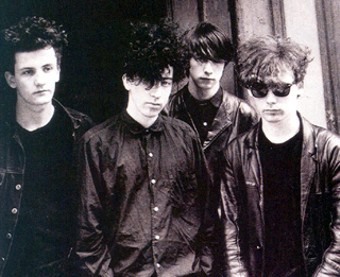 Thomas H Green: Thanks for agreeing to this, I know you don't relish interviews.
Thomas H Green: Thanks for agreeing to this, I know you don't relish interviews.
Jim Reid: Sitting round dredging up sometimes painful memories is not exactly my ideal way to spend an afternoon.
When you hear the word 'indie' nowadays, what comes into your mind?
I've never really known what indie was. I think of indie as an attitude and an approach to making music. You're supposed to be on an independent label but there's no such thing, everything's tied into everything else these days. People think indie is scruffy kids making music that's not very commercial but I'm not sure what it is.
The Mary Chain could be seen as progenitors of a recognisable indie style.
The thing is we were always excluded from that scene because we were on Warner Brothers Records [Blanco Y Negro, a subsidiary]. It used to irritate me because there'd be the indie charts and it never included the Mary Chain. I used to think, what is indie? You get all these bands on a label funded by EMI and for some reason they're indie and we're not. It just used to irk me.
But you were incontestably indie to begin with - your debut single "Upside Down" in 1984 was on Alan McGee's Creation label.
Yeah, the first single was genuinely indie.
Watch the video for "Never Understand":
McGee's career has combined indie underground with pop ambition.
I think we fed off each other. McGee learned a lot from our attitude but we learned a lot from him too. No matter what McGee was saying at the time he always wanted to be involved in the music business for real, not just indie-schmindie stuff. Alan always had big ideas, that's what we had in common and that's why we hit it off right away. In the early Eighties that scene was a celebration of drabness but when we got talking with McGee about where we saw our music going, it was Top of the Pops.
What's your earliest memory as a child?
Nothing to do with music. We used to live in a little tenement in Glasgow. We were quite poor. I actually think fondly now of that place but it was a slum. There was a toilet on the landing that all the flats shared. There was no bath so you had to go once a week to the public baths to get clean. We were on the top floor and there was a loft access on the landing. My earliest memory is coming home one afternoon and somebody had climbed up, punched a hole in our ceiling and burgled us. I remember my mother freaking out and me thinking, hmmm, that's quite exciting, but when I think back we had nothing - they must have been the most disappointed burglars in the world, they must have dropped through that hole, gone, "Fuck, let's go back up, there's nothing here."
Did you have a good relationship with your parents?
We were all quite close when we were kids then round about the time we left school we were huge disappointments to our mum and dad. We were basically social security scroungers for a couple of years, buying all these weird records, wearing funny clothes. But then it all came good, the band happened and I guess they had newfound respect. They realised we actually had a masterplan, and towards the end of their lives we were pretty close.
What did they do for a living?
My dad worked in a factory as a heavy machinery operator and my mother worked in a chip shop.
Did you have any jobs after leaving school?
I worked for two years in the Rolls Royce aeroplane engine factory in East Kilbride as an apprentice joiner. Because it was such a big factory they had to have a team of joiners to repair it. I hated it and have no fond memories at all. I quit then had to leave home because my dad said, "You're not quitting that job and if you do you're not living here." I went to live in London and lasted a miserable, miserable six months. I was a timid sort who didn't make friends easily so I signed on and stayed for a respectable amount of time until my father wouldn't be angry anymore. I went with a mate. He got a job but I discovered that you could get a job or sign on but the money was the same. I made no progress and no money. I just walked round London like a ghost. It was horrible.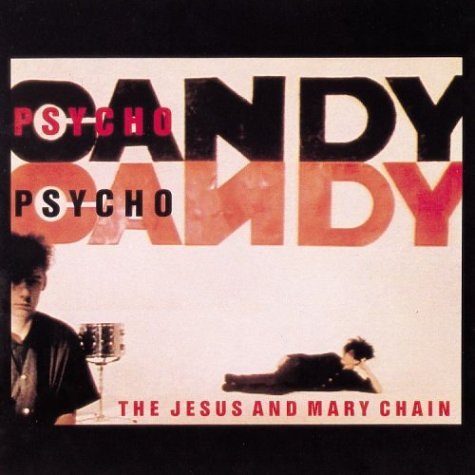 Where did the band name come from?
Where did the band name come from?
My brother made it up. It has no other meaning than what you see. We needed a name. We had a few kicking around but they were crap. We were The Poppyseeds, as I recall, for a couple of weeks and then he just said "The Jesus and Mary Chain" one day. He'd had the idea before but he said it out loud. I thought, that's weird. I'd never really heard a name like that before. It sounded a bit like Echo and the Bunnymen but better. I thought, that's so unusual we'd be idiots not to use it. We'd tell people we got it off the back of a cornflakes box and that did the rounds for years. You'd be interviewed in Belgium or somewhere and it would come up.
What memories do you have of Alan McGee first launching you at his Living Room club in 1984?
That was great. We were in Glasgow but couldn't get a gig there, nobody was interested in putting our records out. We go down to London, McGee, the Living Room, I mean it wasn't exactly the Albert Hall but we were playing in front of an audience, shaking things up a bit. I think we stepped on everyone's toes in that scene because we came along and couldn't play very well but immediately stole all the limelight and everyone was like, "Why them?"
Is it true that you used to hijack other people's gigs in those early days?
I think that's McGee - he used to make up these stories. That may have been true. I can't remember. We certainly used to get beaten up quite a lot in the early days by the so-called house security.
Why?
Because we were snot-nosed kids that used to talk back to them. Almost without fail we'd end up with a punch in the face. Back in the McGee days, the riot days, we hired a security guard to look after us. They were doing things like, "You wait there, I'll check this doorway," but by the end of the evening they said, "If I ever see you little fuckers again I'm going to rip your heads off."
 Reading interviews from the period, you very quickly started saying the riots were getting in the way of the music.
Reading interviews from the period, you very quickly started saying the riots were getting in the way of the music.
Well, they were. It was exciting at the time thinking, this doesn't happen every day, it's a bit out of the ordinary. Not many bands can say, "We provide a riot at our shows," but it was losing the comedy element, something serious was going to happen unless someone nipped it in the bud. I'd go out and look at the audience and there'd be people there who didn't give a toss about the music or the Mary Chain. They'd come along because there'd be trouble, like football hooligans. There'd be guys with clubs and all that. I wasn't worried about us. We started it and to some degree we deserved it but somebody in the audience was going to get their skull cracked open. We just went away for a while and said, "We're not going to do this anymore." We didn't play live for a good few months and it just blew over. Next time we played it was all forgotten about.
In the riot days, were you ever frightened?
Looking back on it there were times when I should have been but I was too wasted to know that I was in danger. At North London Poly there were people beating down our dressing room door. We locked ourselves in there and an angry mob was bashing on the other side. We were just plastered, laughing, "Oh, now it's getting serious, we're running out of beer." That was the attitude.
The Sex Pistols were attacked in the street on a number of occasions by irate members of the public - did that ever happen to you?
It happened to me at a gig. I went to see Nick Cave and the Bad Seeds and some guy walked up to me with a bunch of his mates. He said, "You're that guy from the Mary Chain." I thought it was a fan and said, "Yes," and they all started laying into me. I got a good kick-in that night. They had been at the North London Poly gig and were angry about it, but it was ludicrous.
It has been said that 'Slaughter' Joe Foster was partly responsible for your signature feedback sound.
Joe was Alan's mate at the time and he's a nice enough bloke but we didn't need him. Alan was always trying to foist Joe on us as a producer and we spent more time getting around Joe. He didn't do anything on a Mary Chain record. We knew what we were doing and really didn't need anyone else.
The feedback-drenched single "Never Understand" disintegrates into noise and yelling - how did that come about?
It ends with everything getting louder and louder and then we thought, why don't we all just scream and make it sound like a fight or something? It's William doing most of the yelling. He was good at shouting.
What do you remember about your iconoclastic performance on the Whistle Test in 1985?
I remember I was very, very drunk but most things you're going to ask about I was absolutely pissed all the time. They got us down there at some ludicrous hour, like six in the morning, because they'd heard we were going to be hard to handle. We arrived from some party, having not been to bed, with a big stack of beers. They went, "Oh Christ!" but that was it. We were wobbling all over the place, generally being naughty boys.
Watch "In A Hole" live on The Old Grey Whistle Test below:
You delivered a cacophonous, shambolic performance that was a wonderful antidote to the squeaky-clean pop of the mid-Eighties.
"Shambolic" - that word perfectly describes everything we did then and throughout our career.
You eventually played Top of the Pops.
Only once and we were never asked back. It was the usual story, we got absolutely pissed, just through pure nerves, and we had this knack for offending everybody without even trying.
Well, you deliberately didn't mime properly, if I recall.
That was partly because I was drunk and partly because I thought it kind of looked cool. I remembered how punk bands used to go on and not mime properly and thought, that's what I'll do. They hated it so we only performed in the studio that once. We had other records in the Top 40 and they played a couple of videos here and there, but that was our one and only studio performance.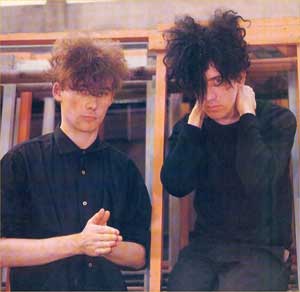 It's hard to comprehend now but bands like the Mary Chain weren't really allowed on TV then.
It's hard to comprehend now but bands like the Mary Chain weren't really allowed on TV then.
That period was like that. The Seventies you had punk bands and glam rock but by the time you got to the Eighties Top of the Pops was totally mainstream and they really didn't enjoy having little twerps like us on.
Even Radio 1 were on the case - didn't the DJ Mike Smith ban your single "Some Candy Talking"?
People think it was banned by the BBC but it actually wasn't. It would have been great if it had been because it would have happened the way it did for Frankie Goes to Hollywood [whose song "Relax" was banned and consequently topped the charts]. It didn't get banned. He just said he wasn't going to play it because he thought it was about drugs so we said [eager voice], "So is it banned then?" "No, I'm just not going to play it."
But you did have John Peel on your side at the BBC.
What would we have done without John Peel? He gave us a radio session before anything, before any record deals. That was amazing because we were still on the dole and there's this guy saying, "Come in, record a bunch of songs and I'll play them on my radio show." We did a few sessions, we did an acoustic one in 1985. The joke was that the original version of "Some Candy Talking" was first recorded for that session. The BBC was later up in arms about that song but they paid for its original recording.
Was the acoustic session to prove your music wasn't just noise?
Yes, at the time we felt people were overlooking the songs. The noise was getting too many headlines so we decided to take the noise away and say, "Look, there are actually some pretty good songs here." Even though when it turned out we had to play them on an acoustic guitar we were like, "Christ, what are we going to do without the big wall of noise, we're actually going to have to learn to play these songs properly." It was terrifying.
Your second album, Darklands, went more in that direction.
It was a couple of years between Darklands and Psychocandy. We had to go away and rethink things. A lot of people were saying, "You've done it, you've made Psychocandy, now split up before you spoil it." It was quite scary following up Psychocandy, we weren't sure what to do. We could have done Psychocandy 2, perhaps we should have done, but we went away and thought, we'll just try and get the balance right, a bit of noise, some straight ahead rock songs, and see how it goes.
Watch The Jesus and Mary Chain on Top of the Pops (low quality):
It worked, it put you in the charts and you always said you were a pop group.
That was always the idea. We grew up watching Marc Bolan and David Bowie on Top of the Pops, later on the punk bands. On the indie scene in the early-to-mid-Eighties it seemed nobody really wanted to be a success and we did. We certainly had no interest in playing some little pub in Islington to 25 people who love your music. We wanted to play big arenas and to be on Top of the Pops, that was always the plan. Trouble is we didn't really know how to go about doing that and all we seemed to do was annoy the fuck out of everybody.
As the Eighties drew to a close many of your peers - notably Bobby Gillespie and Alan McGee - were swept away by acid house and the explosion of dance music, but it didn't seem to impinge on The Jesus and Mary Chain.
We did get into the technology side a little but to suddenly, overnight, become a club band, an acid-house band, would have been ludicrous. It wasn't what we were about or what we knew about but we did co-opt some elements, like samples and drum loops. We had no interest in sounding like another band, we wanted to make records that were a continuation of what had happened before.
You had a bit of a love affair with drum machines from the single "Sidewalking" onwards.
I've always been a sucker for rock'n'roll music that has a wee cheap drum machine in it, right back to Metal Urbain, who were a French punk-rock group but always had this biscuit-tin drum machine, and one of them went on to become Dr Mix and the Remix. The mistake we made was that, for some reason I can't remember, we ended up trying to make the drum machine sound like a real drummer which is where it went a bit wrong.
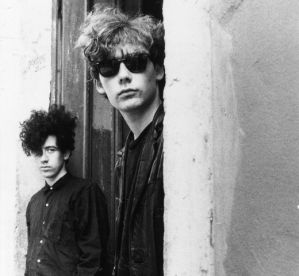 You've said that the Lollapalooza tour in 1992 - where you went round the States with Red Hot Chilli Peppers, Ice Cube, Pearl Jam and others - was one of the worst experiences of your life. Why was that?
You've said that the Lollapalooza tour in 1992 - where you went round the States with Red Hot Chilli Peppers, Ice Cube, Pearl Jam and others - was one of the worst experiences of your life. Why was that?
I'm not very comfortable in the big arena, the showbiz world. William's like that too - he'd probably deny it but he is. We're just uncomfortable socially. When you're in a rock'n'roll band, to an extent you can create your own universe which makes touring bearable. It's quite uncomfortable but you're making up the rules. Well, Lollapalooza wasn't our rules. We were told we were going on at two in the afternoon in the California sunshine. Christ almighty, we never did that before. We were quite low down on the bill and suddenly didn't feel that important. It's like you're intimidated by everything that's going on around you. And then you think, "We've signed onto this for 10 weeks whether we want to or not." It was gruelling, it was terrifying, it was bad for your health. I was never that much into drugs until then but at that point I got quite into cocaine and that was it, it took quite a few years to get that shit out of my life.
The Mary Chain appeared to be a druggy sort of band from the start - would you now say that taking drugs is a bad idea?
I'd never say that to anybody because when I used to hear people say that to me when I was a kid, I used to think, you wanker! People that have that kind of mentality are going to do what they do and nobody saying anything is going to turn them against drugs or drink. Those are the kind of mistakes that you're going to make or you're not going to, and there's not a word that anybody can utter that's going to change your mind.
What about the argument that certain drugs aid creativity, such as acid?
For John Lennon maybe but I cannot imagine sitting writing a song on acid. If it does help you creatively, go for it, if you think you can handle it. I have no problems morally with any drug. If you want to take smack, go out and do it. If you're not going to fuck up anyone else in the process, do it. I actually know people that can function while taking heroin on a regular basis and they don't really do anybody else any harm. They're taking that risk and it's up to them - fine with me. But then if you're going to crawl in my window at three in the morning and nick my DVD player because you want to get money to buy smack, I might have a problem with you.
You live in Devon now.
Yes, east Devon, it's lovely.
How do you spend an average day?
What I can't believe is how much time you have to put into children. Nobody warns you about that. I thought that they might be a pain but how hard can it be? Stick them in front of the boob tube for a couple of hours. I don't understand how people can have busy lives and children, it seems as if all your time is taken up looking after them. It's great and I love it but it's very time-consuming. That's what I spend my days doing, looking after a three-year-old and a seven-year-old.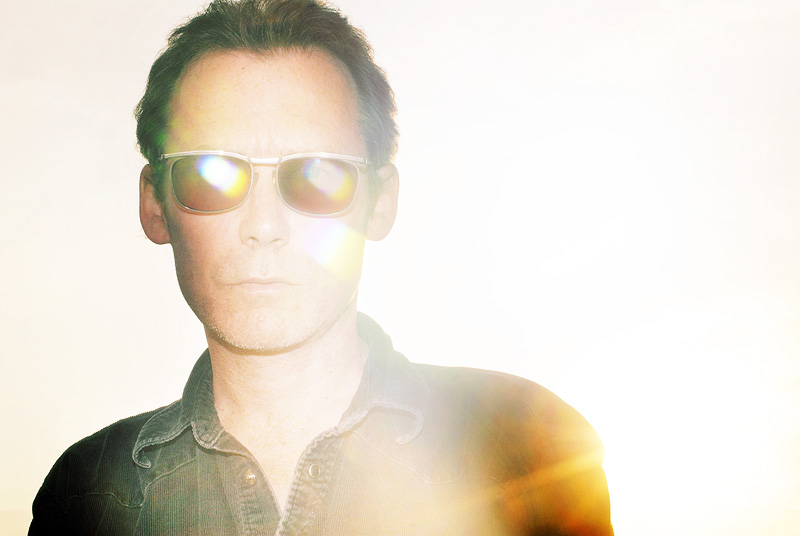 What funds your existence?
What funds your existence?
I'm not exactly loaded but money comes through from time to time and it keeps our heads above water. The Mary Chain played a couple of shows a few years ago that were fairly lucrative [the 2007 reformation]. I mean, I'm not lighting cigars with £50 notes and I'm not, by any means, set up for the rest of my life but we have a level of comfort that's acceptable and if the money runs out one day - and it might - then I'll do whatever it takes, probably jump off a cliff. There's not a lot I can do - looking for a job that pays you to sit on the couch with a remote control drinking beer all day, those sorts of jobs don't tend to exist.
Except in the world of rock'n'roll.
That's my area of expertise.
Do you still love it?
We've got two songs, "I Love Rock'n'Roll" and "I Hate Rock'n'Roll". "I Hate Rock'n'Roll" was William's song about the business and all the things you have to deal with if you're in a band. It sounds like moaning and griping and we should be grateful, but there are a lot of things which you don't think about beforehand that you have to deal with. "I Love Rock'n'Roll" says, "Wait a minute, I love the music." I never stopped loving rock'n'roll but the business side of it I could certainly leave behind... I have left behind.
Are you ever recognised as Jim Reid of the once notorious Jesus and Mary Chain?
Not in Devon. If you walked around where I live like, "I was in a rock'n'roll band," people would just laugh at you. I did [get recognised] when I used to be what you would call a pop star but those days are well behind me now. People don't know who I am. I could walk down Oxford Street and nobody would know.
Did you find recognition uncomfortable?
I didn't like it or enjoy it. When I was a kid I thought it was what I always wanted but when it happened it really messed with my head. I don't like people looking at me, I'm not the kind of person who likes to be the centre of attention. If anybody's looking at me I get quite twitchy and paranoid. After Top of the Pops I wondered, is that person looking at me because they know who I am? It'd really freak me out. Then people would talk to you in clubs. A year before I'd have been standing there and no one would have paid any attention. I just did not enjoy that side of being in a band.
Was it different when you were onstage?
There the drinking was necessary. The fact of the matter is I've always been very shy and I'd never admit that because I thought it was uncool. I was this guy in a band who was too scared to talk to anybody. I found it very uncomfortable to be the singer and the only way I could deal with that was to get absolutely rat-arsed. I hadn't played a sober gig ever until I did some solo gigs of my own five years ago. That was the first time I'd been onstage without anything to help me. It was terrifying but I did it and I wish I could somehow go back and tell myself, "Look, just do it, it's not as bad as you think."
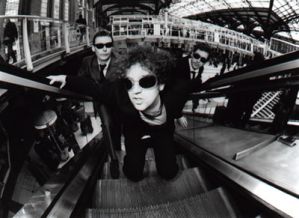 You've mentioned alcohol a few times - how would you characterise your relationship with it?
You've mentioned alcohol a few times - how would you characterise your relationship with it?
As of three days ago I hadn't had a drink for five years. I'm not saying I'll never drink again but what happened was I hit rock bottom, the thing that everybody talks about. You get to the point where you have to make a decision - do you want this life or do you want that life? I chose sobriety, wife and children, all that stuff, but it was kind of "Let's see how it goes, I'll not drink for a year and if I can do that, I'm in charge." I did that then a year became two years, then it just became "Let's see how it goes." I had decided that if I got to five years I was going to have a drink so I got there and... I really want to have a drink, I love drinking, but if I had a beer right now I wouldn't just have a beer, I'd have a beer and that'd be it, I'd be gone for a few days.
Did you just knock it on the head or did you do the whole rehab thing?
One day I just said, "I'm not going to drink anymore." My wife Julie and I talked about it. I said, "Look, I can't tell you I'm never going to drink again, if I told you that I'd be lying. If I say that, I'll be down the pub in a week." So I said I'd stop drinking for a year and she agreed.
Is your solo career now on hold?
To be honest, I don't know if I can be bothered with it. I might do it one day if I feel the need. I dipped a toe in the water and it didn't seem there was much demand for a Jim Reid solo album. You have to respond to that.
Your 2005 solo single "Song for a Secret" reminded me of Buffalo Springfield.
That little "For What it's Worth" guitar part was intentional but I don't think the whole song sounds similar. I've always liked that little clanging guitar noise. I think the Mary Chain used it on a couple of tracks.
Do you have a favourite Jesus and Mary Chain album?
It's not like you go home and listen to your own albums but I like Munki, the last one. At the same time it kind of depresses me because the vibes were so bad when we made it. I just think it's a really good, overlooked record. By the time we made that the Mary Chain, certainly in this country, couldn't get arrested.
Have you noticed other groups walking in your footsteps, noticeably the Black Rebel Motorcycle Club?
I think Black Rebel Motorcycle Club got a bit of a bad rap with the Mary Chain thing. I went to see them and was standing there thinking, this looks familiar - strobes, black, big bouffant hairdos in silhouette... Oh right, this is what it must have been like to see the Mary Chain. Their actual music, though, doesn't have that much of the Mary Chain, it has a lot of their own personality and identity.
What's the last album you bought?
I buy quite a lot of albums. I have to say I'm out of touch with what's going on new music-wise because I think that rock'n'roll's like a cycle and once you've stayed for a full revolution, you've heard it all. It's always been that way and it always will be that way. Once you get round to the point where you came in there's no point in checking out new bands. There will always be bands that take older elements and mix them up. Joy Division sounded to me a bit like The Doors - "New Dawn Fades" was a Doors song - The Stooges were trying to be The Doors but didn't know how to be, the Mary Chain might have been trying to be The Velvet Underground. I kind of tuned out about five years ago.
You weren't tempted to take a side-step into jazz, then?
I always hated jazz but I'm afraid to say I recently started buying jazz albums, the classics, Miles Davis, John Coltrane. I do tend to put it on when I'm doing something else. We have dinner and stick some jazz on so we can still converse with each other without getting lost in the music. You can drop in and drop out. I realise its appeal now.
Should we expect Jim Reid: A Jazz Odyssey?
The Mary Chain occasionally sounded almost jazz but it was more to do with incompetence and bad playing.
What did you make of Brit Pop?
We felt somewhat left out in the cold but felt as if it must have been an exciting and interesting time to be a kid. It was nothing to do with the Mary Chain. We probably wished we were a bit more involved. By that time the Mary Chain were not a band most people would think of as up and coming. We'd been around for years and by then we were on the decline in terms of record sales. We were pretty much marginalised, more so in this country - in Europe and America things held pretty solid for the Mary Chain until the soggy bottom of our bag collapsed in 1998.
"Reverence" in 1992 was really the last big hit.
It was a Top 10 single but it wasn't really a true hit in that our fanbase would buy it, it'd go into the Top 10, then disappear without a trace because it had no radio play.
Which was hardly surprising given the lyrics went, "I wanna die just like Jesus Christ/ I wanna die on a bed of spikes", and "I wanna die just like JFK/ I wanna die on a sunny day".
By that time we were totally fucked off with trying to get back in again and nobody giving us the time of day so we looked at the tunes we had - which one can we make a single? We thought, you know what? Fuck it! Let's do "Reverence". Screw them! We didn't think it would make a dent so when it went into the Top 10 we were astounded.
Watch the video for "Reverence":
When you split up in 1998 you played a particularly drunken show in LA after which William left. You finished the tour, presumably for contract reasons, but did you ever think that maybe you could continue alone?
No, it was understood that when he left I'd finish the tour because it was booked but after that there was no more Mary Chain. I would never do the Mary Chain without William. That was a horrible, horrible tour, really weird. We'd not been getting along for a long time. The making of Munki was unbelievably painful as well. We just couldn't stand each other to the point where he did his songs and I did mine separately with the rest of the band. I started to feel that it wasn't a band anymore. I say this all the time but I really believe things would have been different if someone around us had had the sense to say, "They just need to get away from each other, you go off here, you go off there, come back in six months." Instead somebody booked us into a big fucking world tour so here we are, we can't stand the sight of each other, sitting on a tour bus in America somewhere. We got one day into that tour and the shit hit the fan, we came to blows, he walked off and that was it.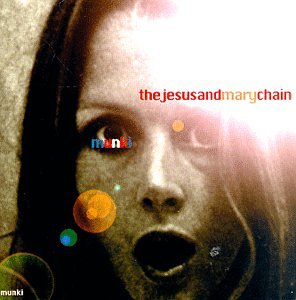 Members irritating each other to the point of meltdown is usually the cause of band disintegration.
Members irritating each other to the point of meltdown is usually the cause of band disintegration.
Had we not been brothers the Mary Chain would have broken up 10 years before it did but because we're brothers we can scream at each other then you kind of have to come back together. In the beginning every argument was constructive, we were like twins, we could almost finish each other's sentences. We really got along, really close, and bit by bit, I don't know how it happened, we started to chip away and disintegrate. By the time it got to Munki we couldn't be in a room together, we'd argue about anything. It was "Do you want a cup of tea?" "No, coffee." "Why do you want coffee?" It just wasn't going to work.
You must now have some idea what other sparring sibling acts such as The Everly Brothers and The Kinks went through.
It's hard enough when you've got a brother you argue with, a normal sibling relationship, but when you're in a band it's like you're in a fucking cupboard - you can't get away from each other. It's so claustrophobic, it's almost like sharing an identity and that's where the problems come from because you're both fighting for your little bit of space in a single identity. I'm sure the Davies brothers or the Gallaghers would say the same.
Given that he later managed Oasis, Alan McGee obviously has a talent for spotting fractious but creative siblings.
I remember him saying he learned a lot from the Reid brothers and it prepared him for the Gallaghers.
Has your sister Linda, who sang on Munki, been a bridge between you and William in tough times?
Poor Linda. We'd be screaming at each other then she'd get calls from each of us in succession - "Guess what that fucker's done now?" I'd hang up and 10 minutes later William would be on the phone. Poor Linda had to put it back together many times.
You and William worked together on her Sister Vanilla project. A decent album, Little Pop Rock, came out of that although it never made any waves.
That's a shame as it was a good record. Typical Mary Chain, we decided to do a record with Linda in 1998, record it in a couple of weeks. I think it took about 10 years. There were times when all three of us were working together, not many, generally speaking, as William moved to LA at the end of the Nineties. She'd visit him and do some recording and we still had The Drugstore, our studio in London, so I'd go in there with Linda, then sometimes we'd all get together at William's to do a bit of recording.
Watch the video for Sister Vanilla's "Can't Stop The Rock":
Does she still have musical aspirations?
[Laughs for only time during interview] No, we knocked that out of her. I don't think she ever wants to listen to music again, let alone make it.
When were the Mary Chain at their money-making peak?
Towards the end of the Eighties. I wasn't rich but I could buy what I wanted without wincing too much. I couldn't buy a Jaguar but if I wanted a good stereo I could buy it and that felt good because I was very poor growing up. I could have lived a comfortable lifestyle but buying drugs, that was the downside. I could afford to buy as much cocaine as I could handle. I probably blew a lot of money on that.
When did you stop that, then?
Towards the end of the band. When the band broke up, I was broke so I couldn't afford to buy coke anymore so that was it. I was forced to stop taking it. At the end of the Nineties I stopped taking drugs but I was still drinking. What money I had I spent in the pub. My wife put me on the road to recovery. I've been with her eight years. She was a picture editor but she's a housewife now and manages our affairs.
 The Jesus and Mary Chain are not a celebrity-seeking band so how come Scarlett Johansson sang with you when you reformed to play Coachella in 2007?
The Jesus and Mary Chain are not a celebrity-seeking band so how come Scarlett Johansson sang with you when you reformed to play Coachella in 2007?
We decided we wanted someone to sing the end bit of "Just Like Honey", the female vocal part. William said, "Why don't we ask Scarlett Johansson because the song was used in that Lost in Translation film?" We completely expected she'd say, "Who?" or "Get on your bike, pal," but there was a connection because she was doing a record that was coming out on Rhino, our label in America, so we had a way to get a message to her. She said, "Yeah," simple as that. She came along to soundcheck, hung about with us, very sweet, down to earth, not very Hollywood and movie star-ish at all.
Has William been affected by living on LA? Has he turned into a cartoon rock star like so many Brit musicians in LA?
No, he stumbles around Beverly Hills like Rab C Nesbitt.
He's not on the wagon then?
Unfortunately not but that's a decision you have to come to yourself. We did [Sex Pistol] Steve Jones's radio show a couple of years ago when I was out there and he was trying to help William out. He gave William his phone number and said, "I'll try and help you with this." I think William thought he was just being polite but I don't think he was, I think he was genuinely offering to help William get over it. William, as you possibly realise, is one of those who likes the sauce, like I do.
The forthcoming Creation Records documentary is called Upside Down after the Mary Chain song - have you had anything to do with it?
Yes, I was interviewed. My wife saw it and said it was good but I couldn't bring myself to look. I can't bear to watch myself being interviewed or in performance.
When you came back together in 2007 did the inter-brother fighting start again?
Because we're brothers it wasn't like a normal band breaking up - we did see each other over the time when there was no Mary Chain so we had a fair idea how it would go down. I didn't think it was going to be a picnic but I thought we could do it or I wouldn't have agreed to it. It was pretty much how I imagined it would be. We still bicker but we're a bit older and I'm soberer - that helps. If both of you are off your tits there's no holds barred, anything is fair game. Sober I was thinking, this isn't worth it, we're here to do a job, let's just get the job done.
You had a new song, "All Things Must Pass" on the soundtrack to the TV series Heroes a couple of years ago.
That's the only new thing to be released. William's doing a solo album right now. To be totally honest he was gung ho about doing a new Mary Chain album and then got frustrated because I was like, "Hmm, don't think I can stand the nervous breakdown." He just got fed up and is making a solo record now. He started doing it before the band reformed but now he's back with it.
Does this mean there's still potential for more Jesus and Mary Chain action?
There's been talk about another album. There's certainly another album's worth of material, all demos and some of it's actually recorded. It just seems hard to actually get it together. It's a question of finding the time and deciding where it's actually going to be recorded. It may happen, it may not.
Explore topics
Share this article
Add comment
The future of Arts Journalism
You can stop theartsdesk.com closing!
We urgently need financing to survive. Our fundraising drive has thus far raised £49,000 but we need to reach £100,000 or we will be forced to close. Please contribute here: https://gofund.me/c3f6033d
And if you can forward this information to anyone who might assist, we’d be grateful.

Subscribe to theartsdesk.com
Thank you for continuing to read our work on theartsdesk.com. For unlimited access to every article in its entirety, including our archive of more than 15,000 pieces, we're asking for £5 per month or £40 per year. We feel it's a very good deal, and hope you do too.
To take a subscription now simply click here.
And if you're looking for that extra gift for a friend or family member, why not treat them to a theartsdesk.com gift subscription?
more New music
 Cat Burns finds 'How to Be Human' but maybe not her own sound
A charming and distinctive voice stifled by generic production
Cat Burns finds 'How to Be Human' but maybe not her own sound
A charming and distinctive voice stifled by generic production
 Todd Rundgren, London Palladium review - bold, soul-inclined makeover charms and enthrals
The wizard confirms why he is a true star
Todd Rundgren, London Palladium review - bold, soul-inclined makeover charms and enthrals
The wizard confirms why he is a true star
 It’s back to the beginning for the latest Dylan Bootleg
Eight CDs encompass Dylan’s earliest recordings up to his first major-league concert
It’s back to the beginning for the latest Dylan Bootleg
Eight CDs encompass Dylan’s earliest recordings up to his first major-league concert
 Ireland's Hilary Woods casts a hypnotic spell with 'Night CRIÚ'
The former bassist of the grunge-leaning trio JJ72 embraces the spectral
Ireland's Hilary Woods casts a hypnotic spell with 'Night CRIÚ'
The former bassist of the grunge-leaning trio JJ72 embraces the spectral
 Lily Allen's 'West End Girl' offers a bloody, broken view into the wreckage of her marriage
Singer's return after seven years away from music is autofiction in the brutally raw
Lily Allen's 'West End Girl' offers a bloody, broken view into the wreckage of her marriage
Singer's return after seven years away from music is autofiction in the brutally raw
 Music Reissues Weekly: Joe Meek - A Curious Mind
How the maverick Sixties producer’s preoccupations influenced his creations
Music Reissues Weekly: Joe Meek - A Curious Mind
How the maverick Sixties producer’s preoccupations influenced his creations
 Pop Will Eat Itself, O2 Institute, Birmingham review - Poppies are back on patrol
PWEI hit home turf and blow the place up
Pop Will Eat Itself, O2 Institute, Birmingham review - Poppies are back on patrol
PWEI hit home turf and blow the place up
 'Fevereaten' sees gothic punk-metallers Witch Fever revel in atmospheric paganist raging
Second album from heavy-riffing quartet expands sonically on their debut
'Fevereaten' sees gothic punk-metallers Witch Fever revel in atmospheric paganist raging
Second album from heavy-riffing quartet expands sonically on their debut
 theartsdesk Q&A: Soft Cell
Upon the untimely passing of Dave Ball we revisit our September 2018 Soft Cell interview
theartsdesk Q&A: Soft Cell
Upon the untimely passing of Dave Ball we revisit our September 2018 Soft Cell interview
 Demi Lovato's ninth album, 'It's Not That Deep', goes for a frolic on the dancefloor
US pop icon's latest is full of unpretentious pop-club bangers
Demi Lovato's ninth album, 'It's Not That Deep', goes for a frolic on the dancefloor
US pop icon's latest is full of unpretentious pop-club bangers
 Yazmin Lacey confirms her place in a vital soul movement with 'Teal Dreams'
Intimacy and rich poetry on UK soul star's second LP
Yazmin Lacey confirms her place in a vital soul movement with 'Teal Dreams'
Intimacy and rich poetry on UK soul star's second LP
 Solar Eyes, Hare & Hounds, Birmingham review - local lads lay down some new tunes for a home crowd
Psychedelic indie dance music marinated in swirling dry ice
Solar Eyes, Hare & Hounds, Birmingham review - local lads lay down some new tunes for a home crowd
Psychedelic indie dance music marinated in swirling dry ice

Comments
...
...
...
...
...
...
...